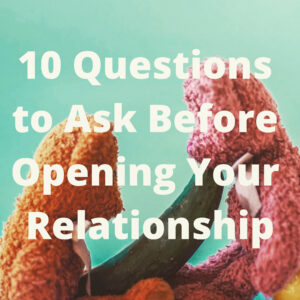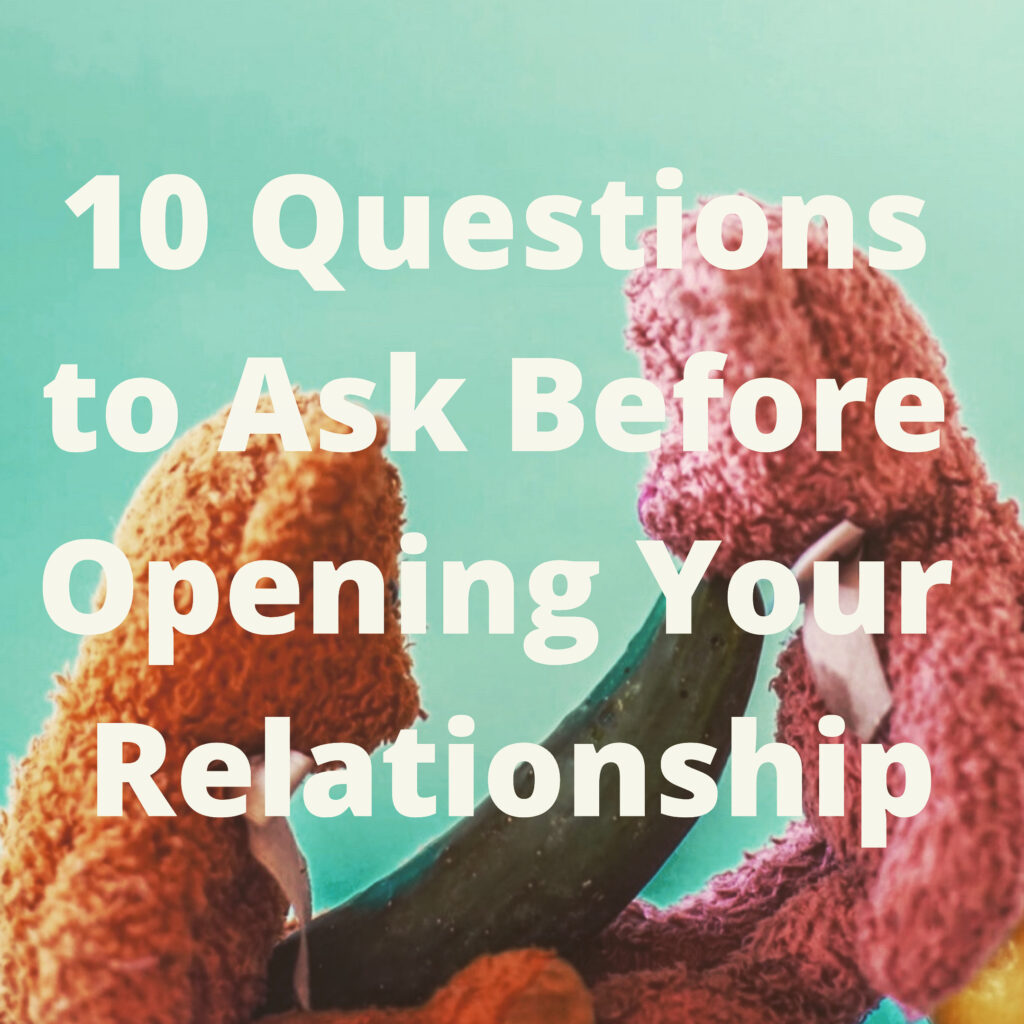So, you’re thinking about opening your relationship? The beginning journey of opening any relationship can come with its own set of challenges.
Regardless if you’re thinking about this or in an existing open relationship, it’s important to consider what this means for you, your partner – but most importantly, your relationship.

Different people have different reasons why they’ve chosen to open their relationship. What matters most is that it’s a collective decision that is made together. While many romanticize the idea of being in an open relationship, if not addressed it can easily fall apart.
Individuals and couples who are considering an open relationship can easily find themselves frustrated with themselves or their partner.
10 questions to ask yourself if exploring the idea of an open relationship is right for you.
1. Is this what we both want and agree to?
While the thought of an open relationship can be enticing, it’s important to ask if this something we both want? If you’re able to clearly answer this question, it may indicate you’re both at a point of emotional maturity in your relationship where non-monogamy can be explored.
If either of you isn’t fully comfortable or feel pressured by the other to open the relationship – you may want to consider waiting until you both can come to an agreement before exploring this together.
2. How will this change my relationship?
It’s easy to romanticize the thought of opening the relationship and fail to think about how it will change the dynamic of what you share.
It’s possible after you’ve opened the relationship that your partner may decide they no longer want to be open. Possibly they want to change the structure or end the relationship altogether.
Many people have and experience healthy open relationships, but that is because they’ve considered the risk, have engaged in intentional communication, and stand behind this decision together.
3. Have you assessed the current health of your relationship?
 Couples discussing opening their relationship sometimes find it difficult to really process what this transition will mean for them.
Couples discussing opening their relationship sometimes find it difficult to really process what this transition will mean for them.
It’s important to think about how this change will impact you and your partner, but most importantly your relationship.
Working with couples I often remind them before considering changes in the relationship structure, they need to assess the current health of their relationship. Meaning, how do you handle conflict, how do you argue, what does jealousy look like?
If the relationship is struggling or unstable, how unstable will it be after opening things up?
4. What is the agreement you’re both agreeing to?
You’re at a point where you’ve begun conversations and both in agreement about opening things up. That’s awesome – but, have you discussed the rules?
While it may seem unconventional, if you’re going to be in an open relationship it’s important to start asking questions and lay down clear guidelines.
When establishing ground rules, it’s important to explore what you both are comfortable with. Also, how will you handle conflict if one of you breaks the agreement?
In monogamy, the concept of fidelity is assumed, as discussed in a recent article posted by Psychology Today. While monogamy assumes fidelity, couples in open relationships also need to engage in conversations about fidelity.
What’s most important when exploring how to open the relationship, is each of you will have focused conversations on the guidelines that you and your partner have agreed upon. By establishing an agreement, you both agree to, it will improve the quality of communication and establish the expectation.
Remember, the guidelines you’ve established are not fixed – you’ll just need to talk about changes before they occurred.
5. How is the communication in the relationship?
While communication is the key to success in any relationship, it’s especially important in relationships where non-monogamy is practiced.

If you have difficulties communicating about the small things, how will you communicate after the relationship has opened?
Individuals who’ve practice non-monogamy understand and work to address breakdowns in communication early within their relationships. However, when introducing changes, it’s important for couples to be intentional in the way they communicate and handle disagreements.
By being intentional in our communication it’s easy to deal with conflict and express our needs.
Opening the relationship isn’t just about sex, it’s about trust and most importantly – healthy communication.
6. What type of open relationship do you both want?
What’s important to understand is there isn’t just one type of open relationship. In fact, there are many types of structures that exist.
Because monogamy is heavily practiced, taught, and seen in everyday life (i.e., seen on television, by our parents, in our friendships, in the media, etc…) we see little to no referencing of anything but monogamy.
Different people have different types of open relationships. Some couples are completely open, while others feel comfortable with having a partially open relationship. Some couples are fine with their partner engaging sexually without them. While others want to ensure that when sexual activity occurs both partners are present.
Honestly, it doesn’t matter which structure you decide. What matters most is that you both agree to the guidelines you’ve established. And remember, the agreement you’ve made can be negotiated at any time.
7. How do you both handle jealousy?
Jealousy is one of the most common issues many couples experience. And while it can feel uncomfortable, it is only a natural reaction – even the best of us experience jealousy.
What’s important is you both are able to communicate openly when jealousy presents itself within the relationship.
Culturally, jealousy is viewed negatively and extremely difficult to navigate. Many couples use The Ethical Slut as a roadmap for guidance when encountering jealousy in their relationship.
What’s important is, to be honest, and open about jealousy. Being open about how we fill will improve communication and help you move forward in the relationship. By addressing jealousy when it’s happening, it will prevent the onset of structural and/or emotional breakdowns.
8. Are you both willing to give up control?
The challenges faced in any relationship is when things feel out of control. This is generally when couples will seek out professional help, with a therapist.
Relinquishing control is important, and necessary when opening a relationship. Often this is easier said than done.
Because open relationships require intentional communication, both partners must be willing to relinquish control and engage in perspective-taking. This is when we attempt to take on and see the perspective of the other person.
When we engage in intentional perspective-taking, we can let go of our position and better understand our partner. Couples who do this, find it easier to manage conflict in their relationships.
By being intentional in relinquishing control, we can focus on managing conflict with our partner.
9. Do you really trust your partner – do you trust each other?
While we say we trust our partner – do you really trust them? Do they trust you?
Many people experience issues around trusting their partner. According to Joyce Catlett many couples have issues around trust. Essentially issues of trust revolve around early attachments that we’ve developed as children. Diving into relational attachments with trust, many people begin relationships with the subconscious belief that people shouldn’t be trusted.
 And while we shouldn’t blanketly trust anyone, if either of you has issues around trust opening the relationship may cause more issues of trust.
And while we shouldn’t blanketly trust anyone, if either of you has issues around trust opening the relationship may cause more issues of trust.
In complete honesty, ask yourself a few questions – Do I fully trust my partner that they will not violate our agreement? Can the same be said for me?
What’s known is individuals who’ve been in successful open relationships, have learned to be intentional in trusting their partner.
If there are existing issues of trust in the relationships, I recommend working with a Therapist before opening the relationship.
10. How do we handle conflict?
Arguing and disagreements are a natural part of any relationship. When conflict emerges, it can be difficult to navigate. Often couples will repeat the same arguments and don’t understand why – this is called repetitive cycling.
We must be aware of how we manage conflict in our lives, but most importantly in our relationships.
Couples who are new to opening the relationship can sometimes struggle to manage conflict when it emerges. It’s completely natural after opening a relationship to experience conflict. What’s most important is how that conflict is handled.
While we cannot determine for certain what will be felt after the relationship has opened, we can begin to examine our reaction to this experience. By taking an emotional inventory of what we are feeling, we can communicate more effectively with our partner.
_____
Dr. Richard Mills is a New York City based Sex Therapist. Tune in weekly to Talk Sex With Dick, where he addresses issues related to sex, sexuality, dating, and life.






